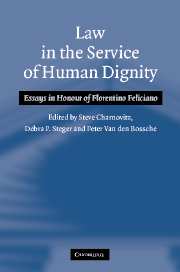Book contents
- Frontmatter
- Contents
- List of contributors
- Preface
- Biographical note
- List of abbreviations
- PART I Reflections on the contributions of Florentino Feliciano to international law
- PART II Insights into the World Trade Organization
- PART III The changing landscape of investment arbitration
- 17 The reshaping of the international law of foreign investment by concordant Bilateral Investment Treaties
- 18 ICSID arbitration and the state's increasingly remote consent: apropos the Maffezini case
- 19 The notion of investment in recent practice
- 20 Arbitration of investment disputes under UNCITRAL Rules and the choice of applicable law
- PART IV New challenges in international adjudication
- Bibliography of works by Florentino Feliciano
- Index
17 - The reshaping of the international law of foreign investment by concordant Bilateral Investment Treaties
from PART III - The changing landscape of investment arbitration
Published online by Cambridge University Press: 29 July 2009
- Frontmatter
- Contents
- List of contributors
- Preface
- Biographical note
- List of abbreviations
- PART I Reflections on the contributions of Florentino Feliciano to international law
- PART II Insights into the World Trade Organization
- PART III The changing landscape of investment arbitration
- 17 The reshaping of the international law of foreign investment by concordant Bilateral Investment Treaties
- 18 ICSID arbitration and the state's increasingly remote consent: apropos the Maffezini case
- 19 The notion of investment in recent practice
- 20 Arbitration of investment disputes under UNCITRAL Rules and the choice of applicable law
- PART IV New challenges in international adjudication
- Bibliography of works by Florentino Feliciano
- Index
Summary
Florentino Feliciano, in the course of his multifaceted and distinguished career as a scholar, practitioner, Justice of the Supreme Court of the Philippines, Member and Chairman of the Appellate Body of the World Trade Organization, judge of the Administrative Tribunal of the World Bank, and international arbitrator, has made his mark in more than one field of the law, national and international. His international imprint may be greatest on the law of international trade. A chapter in a collection in his honour in the allied area of international investment, another sphere in which his influence is considerable, is fitting.
What law governs the treatment of the investments by a national of one state in the territory of another state has long been in dispute. No less in dispute has been the question of the content of that governing law.
In the nineteenth century and the earlier decades of the twentieth, the Latin-American states espoused the Calvo Doctrine, subjecting foreigners and their investments exclusively to the law of the host state and excluding diplomatic intervention on their behalf. While efforts to promote this Doctrine by treaty, and through provisions of constitutional and domestic law, were ineffectual, the use of a ‘Calvo Clause’ in contracts with aliens became widespread. By the terms of the Calvo Clause, the alien contractor accepted the national law and courts of the host state as governing and renounced any right of diplomatic interposition by the state of which it was a national.
- Type
- Chapter
- Information
- Law in the Service of Human DignityEssays in Honour of Florentino Feliciano, pp. 241 - 245Publisher: Cambridge University PressPrint publication year: 2005
- 28
- Cited by

